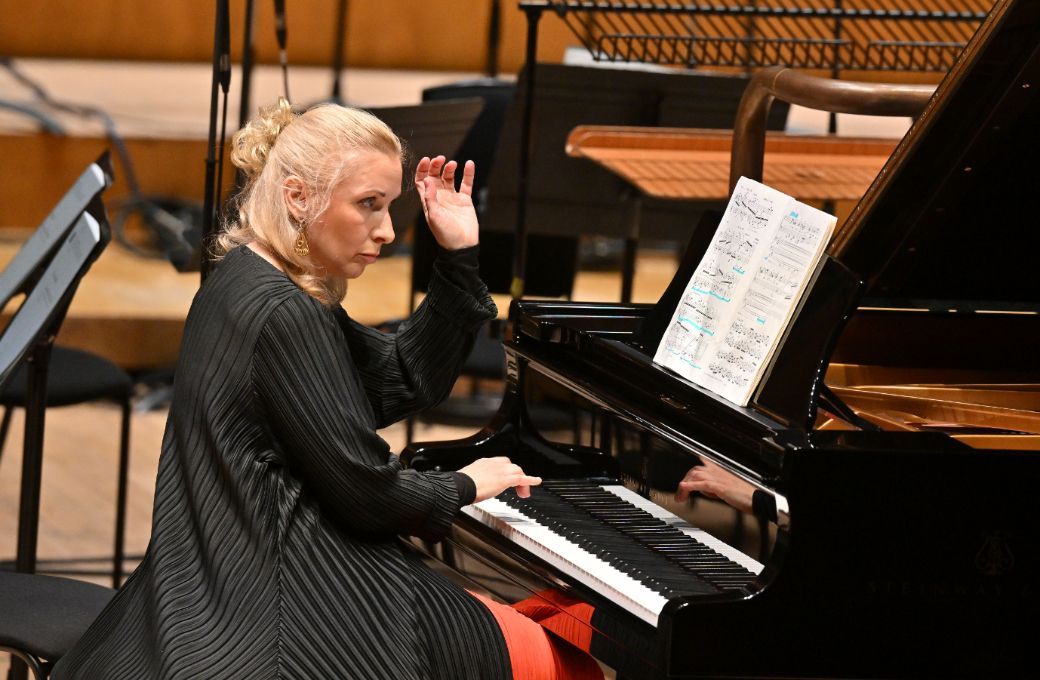Last week the city of Paris paid tribute to Pierre Boulez (born on 26th March 1925) with three days of sold-out events reviving many of his major works. In London – where he made if anything an even greater impact on cultural life – the centenary celebrations have been more muted. No doubt money is an issue, so too a local and sclerotic anxiety over modernism in music (as distinct from other art forms).

At the Barbican on Sunday, packed lecture theatres and well attended concerts attested to a stubbornly enthusiastic public for Boulez, almost a decade after his death, still eager to abandon themselves to a world of “organised delirium”. This mission statement of his from the late 1940s found violent and untrammelled expression above all in the Second Piano Sonata. Tamara Stefanovich performed heroics in holding some kind of formal grip on music which goes to war with everything else, and in that sense paradoxically underlined its Beethovenian qualities of disciplined resistance.
And yet once Boulez had blown up music, his own and everyone else’s, he set about a project of reconstruction, aesthetic as well as physical. Lily Payne negotiated a stylishly theatrical course through Domaines (1961-8) for solo clarinet, elucidating its mirror construction and its melodic heritage in The Soldier’s Tale of Stravinsky. Another Guildhall School clarinettist, Beñat Erro Diaz, conversed with his ghostly recorded alter ego in Dialogue de l’ombre double from the 80s, so that we could hear directly how Boulez drove technological innovation, which then opened new windows of expression for him, much as the rapidly evolving piano had done for Viennese composers at the turn of the 19th century. The virtual end of the Dialogue seemed to trail off down a long corridor: a poignant effect unachievable on record, and evoking the same elegiac spirit as the Mémoriale in which Boulez paid tribute to Stravinsky and others dear to him.
Earlier in the week, the Manson Ensemble of the Royal Academy of Music had given Mémoriale within an enthralling all-Boulez evening, directed by Susanna Mälkki, which reached its climax in the thrilling cascades of Sur Incises – ‘late’ Boulez, from the late 90s, and still potentially a bewitching revelation for sceptical listeners who struggle to move on from the image of Boulez the angry young man. In the main-evening concert of Boulez Day, it was all the more illuminating to hear Stefanovich return for Incises, which could be enjoyed for itself as a brilliant, French-accented piano toccata after the fashion of Prokofiev.
No less valuably, Stefanovich prefaced Incises with the 12 Notations in which the 20-year-old Boulez had captured almost in diary form ideas which he would go on to explore for the rest of his life. Engaging with Boulez’s music like this becomes an exercise in close reading and cross-referencing, in which apparently isolated shapes and harmonies take on new meaning as cardinal points of orientation in a life’s work. Through the course of the day, the nature of Boulez’s inspiration as essentially poetic, as well as elegiac, slowly revealed itself – in the rhetoric of the Second Sonata’s finale, in the musing soliloquies of the clarinet pieces and then in Cummings ist der Dichter. Deprived of the text in either printed or surtitled form, the identity of the poet in question proved somewhat academic.
The fitting and magnificent climax to the day came with Pli selon pli, Boulez’s “Portrait of Mallarmé”, to which everything else served in retrospect as an extended prelude. When we write about others, we reveal most about ourselves, it is said, and the five movements of Pli selon pli form a kind of life-cycle in tribute to the poet, mirrored by the evolution of the piece as Boulez revised it through the course of his career. What he achieves is a direct but entirely musical translation of poetry into sound, without a single recourse to literal equivalence. Such equivalence would anyway make no sense in setting language which has enveloped itself in surrealism. Instead, the mind and ear are drawn into a state akin to lucid dreaming, in which fantastical images make perfect sense, not one of them clouded by "impressionism" but instead etched into sound, and punctuated all the while by a battery of keyed and metal instruments.
At one of the talks in the day, members of the BBC Symphony Orchestra had paid tribute to Boulez’s tenure as their Chief Conductor, instilling in them a sensitivity to the grammar of modernism and expertise in bringing it to life: getting them to really listen to the score and to each other, which is the conductor’s foremost task. As a body, they went on to play Pli selon pli as though Boulez had written it for them, with remarkable assurance which must have been borne of exhaustive rehearsal as well as that historical affinity. Anna Dennis sang with an exotic and hieratic allure that connected the piece back to Ravel’s settings of Mallarmé, while Martyn Brabbins conducted in the image of Boulez himself. It hardly seems possible that such music will ever grow old.


